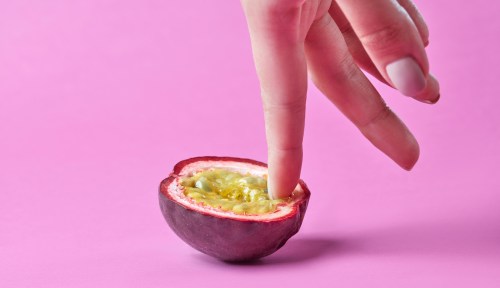OK TMI: Should I Be Worried About Being, Ahem, Too Tight After a Serious Sex Draught
Navigating a pandemic-caused sexual dry spell? If so, you might worry "is my vagina too tight to for enjoyable penetration?" Here, an OB/GYN weighs in.

I bruised my vagina the other day. The specifics are unimportant (or, more accurately, information I’m looking to save for the memoirs) but did lead me to divulge to my roommate that I worry the injury might be evidence of my body “revirginizing” itself during this time in quarantine. You know, like my hymen is closing after extended time of not being used. “Is that a thing that can happen?” she asked. And for anyone other vagina-havers in my boat who are navigating a pandemic-induced dry spell, you may be wondering something similar. That is, can a lack of action make your vagina too tight to enjoy penetration?
Experts in This Article
board-certified OB/GYN, reproductive endocrinologist, and infertility specialist
I mean, I certainly hope not. After the bad-news parade that’s come to exemplify this year so far, who the hell wants the very first time in a long time to be anything less than fireworks of pleasure and multiple orgasms? I definitely don’t, and remembering some realities about virginity and science immediately left me feeling reassured.
Most important to remember is that virginity is a social construct—because you, and only you, get to choose what constitutes your first sexual experience. Furthermore, a person’s hymen—the thin tissue commonly surrounding the opening of the vagina—does not regenerate, but rather thins and stretches over time, regardless of penetration. That means the very notion of the hymen “breaking” upon the first instance of vaginal penetration is a misnomer and is not tied to any loss of virginity in a biological sense. And even though a vagina may feel tighter following decreased sexual activity, it actually is not. Rather, that sensation is explained by other factors.
“Lack of sex can lead to less lubrication and less blood flow and oxygenation to the vaginal skin, which can lead to the first time having sex after a long dry spell to feel a little more painful than it normally would.” —Lucky Sekhon, MD, OB/GYN
“Lack of sex can lead to less lubrication and less blood flow and oxygenation to the vaginal skin, which can lead to the first time having sex after a long dry spell to feel a little more painful than it normally would,” says Lucky Sekhon, MD, fertility specialist and board-certified OB/GYN. “This may be compounded by increased inhibition or apprehension, which can build up over time when abstaining from regular sexual activity.”
This isn’t an uncommon issue for vulva-owners, and Dr. Sekhon adds that both physical and mental effects—lack of lubrication, blood flow, and oxygenation, in addition to inhibition and apprehension, respectively—can make a person feel as though the vagina is smaller than it once was. Furthermore, “the pelvic-floor muscles may feel more tense, which can lead to tightening of muscles during penetration,” she says. “If this is severe enough, it is called vaginismus and can lead to painful intercourse.”
Dr. Sekhon notes that vaginismus is a disorder that involves hyperactivity of the pelvic muscles, and may have nothing to do with going through a sex draught. If you experience painful resistance when it comes to regular penetration, and not just when it’s been a while, it might be worth an appointment with your doctor.
Otherwise, what can you do to get ahead of the issue of feeling like your vagina is too tight to enjoy sex after dry spell? Well, considering that self pleasure is self care, practice on yourself. “Masturbation can help to prepare your body’s sexual response to stimulation,” says Dr. Sekhon. “It can also help to jump-start lubrication and blood flow to the vagina. Likewise, [non-penetrative] foreplay is important to help with these issues, and to make [penetrative] sex more pleasurable and less uncomfortable.”
To ease your anxieties before you hop into bed, Dr. Sekhon advises you give yourself some TLC that goes beyond self pleasure. Because there’s such a deep mind-body connection when it comes to this issue, being able to unwind and calm yourself down is key. “Try relaxation techniques such as deep breathing, taking a hot bath beforehand, and having a glass of wine, and so on,” she says. And, lastly, she offers the friendly reminder that “personal lubricant will definitely help to reduce friction and improve comfort.”
Oh hi! You look like someone who loves free workouts, discounts for cult-fave wellness brands, and exclusive Well+Good content. Sign up for Well+, our online community of wellness insiders, and unlock your rewards instantly.










